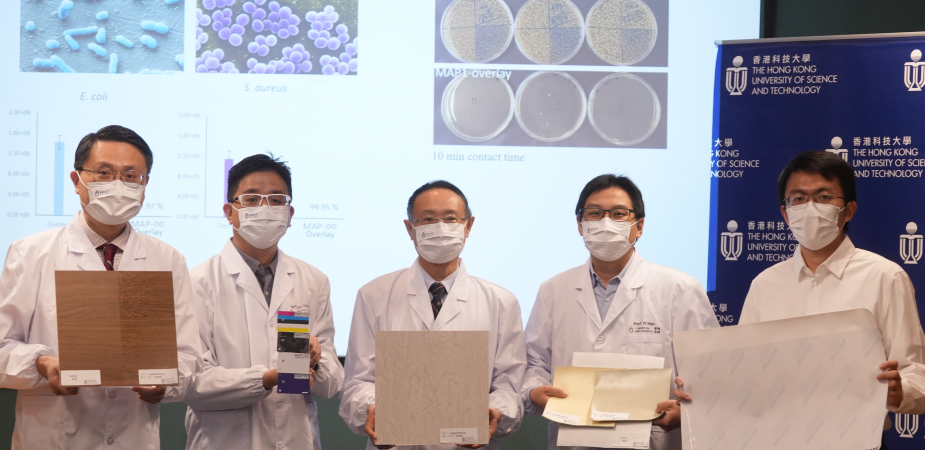

PARTNERING WITH INDUSTRY AND GOVERNMENT TO ADDRESS HEALTH AND ENVIRONMENTAL CHALLENGES
Besides founding start-ups, HKUST researchers successfully collaborate with external partners to transfer cutting-edge research technologies to society. Recent extensions of the eco-friendly multilevel anti-microbial polymer technology (MAP-1), developed by a research team led by Prof. YEUNG King-Lun, Department of Chemical and Biological Engineering and Division of Environment and Sustainability, provide a significant example of how one fundamentally well-conceived HKUST technology can deliver multiple applications of benefit to the wider community through partnerships with industry and government.
The MAP-1 coating is a “smart”, non-toxic technology that is fast and effective in inactivating up to 99.9% of highly infectious viruses on surfaces for up to 90 days. It is the result of 15 years’ research optimization by Prof. Yeung, with funding support from the government’s ITC, and field testing in public hospitals, among other locations. It was co-developed and licensed by Chiaphua Industries Limited (CIL) for commercialization as GERMAGIC™. The technology has already proved an essential part of Hong Kong’s battle against COVID-19 through large-scale sanitization of surfaces in diverse premises, including schools, elderly homes, shopping malls, and sub-divided flats. Recently, the research team and CIL have extended the original technology to develop MAP∞, raising effectiveness from 90 days to five years for products that are constantly handled, such as plastic cards and spectacles, and sustained effectiveness against COVID-19, including Omicron. This has again been licensed by Chiaphua Industries.
In a further extension, a research team led by Prof. Yeung and funded by ITC has developed a multifunctional hydrogel that can be tailored to treat diverse odor problems and microbial contamination safely and efficiently. The team has been working with the Drainage Services Department to apply and test an inexpensive and ecofriendly MalOdor-Control (MOC) hydrogel at manholes, nullahs, water channels, and other drainage sites. Testing has proved the technology effective in suppressing 99% of hydrogen sulfide, 80%-90% of Volatile Organic Compounds produced by microbes, and 80%-90% of sulfate-reducing bacteria. All commonly lead to foul odors, causing a nuisance to the community.
A new anti-microbial hydrogel (AMGel) that disinfects flush water, removing bacteria and viruses, including Omicron, is now being trialed at 2,880 flats at three public housing blocks in collaboration with the Housing Authority, and an elderly home under ITC’s Public Sector Trial Scheme. With CIL’s support, AMGel is also due to be applied to flush water systems in primary/secondary schools and subdivided flats in Sham Shui Po.
Along with disinfection of surfaces and water, the research team has developed a potent air purification technology to address airborne microbial transmission. The HKUST-developed air purification system is able to remove up to 99.999 percent of airborne bacteria and viruses and is available in the retail market as a household purifier. Industrial partner CIL has also donated up to HK$1.5 million worth of anti-microbial air filters to various hospitals in the Mainland, including Wuhan’s COVID-19 emergency Huoshenshan Hospital.
